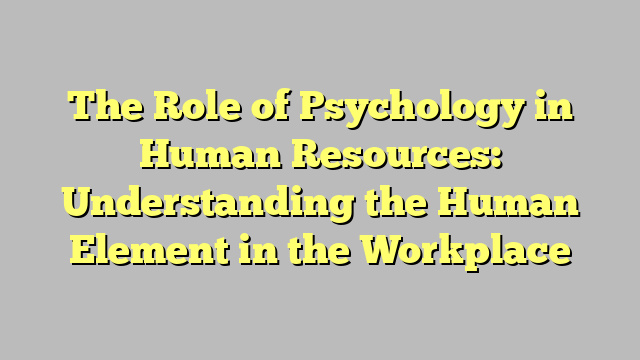The Role of Psychology in Human Resources: Understanding the Human Element in the Workplace
The Role of Psychology in Human Resources: Understanding the Human Element in the Workplace
Introduction
Human resources (HR) is a crucial department in any organization, responsible for managing the most valuable asset – the employees. While HR traditionally focused on administrative tasks such as recruitment, payroll, and benefits, the role of psychology in human resources has gained significant importance in recent years. Understanding the human element in the workplace is essential for creating a positive and productive work environment.
The Importance of Psychology in HR
Psychology plays a vital role in HR as it helps in understanding human behavior, motivations, and emotions. By applying psychological principles, HR professionals can effectively manage employee relations, enhance job satisfaction, and improve overall organizational performance.
1. Recruitment and Selection
Psychology helps HR professionals in the recruitment and selection process by understanding the psychological traits and skills required for a particular job. By using psychological assessments and tests, HR can identify the right candidates who possess the necessary qualities for success in the role. This ensures a better fit between the employee and the job, leading to higher job satisfaction and lower turnover rates.
2. Employee Engagement
Employee engagement is crucial for organizational success. Psychology helps HR professionals in understanding the factors that drive employee engagement and designing strategies to enhance it. By conducting surveys, interviews, and focus groups, HR can identify the key drivers of engagement and develop initiatives to foster a positive work environment. This can include providing opportunities for growth and development, recognizing and rewarding employees’ contributions, and promoting work-life balance.
3. Performance Management
Psychology plays a significant role in performance management. HR professionals can use psychological principles to set clear performance expectations, provide constructive feedback, and motivate employees to achieve their goals. By understanding individual differences and tailoring performance management strategies accordingly, HR can create a fair and objective evaluation process that promotes employee growth and development.
4. Conflict Resolution
Conflict is inevitable in any workplace. However, HR professionals with a background in psychology can effectively manage and resolve conflicts. By understanding the underlying causes of conflicts and using techniques such as active listening, mediation, and negotiation, HR can facilitate open communication and find mutually beneficial solutions. This helps in maintaining a harmonious work environment and fostering positive relationships among employees.
The Role of Psychology in Organizational Culture
Organizational culture refers to the shared values, beliefs, and behaviors that shape the work environment. Psychology plays a crucial role in understanding and shaping organizational culture.
1. Leadership Development
Psychology helps HR professionals in developing effective leaders. By understanding the psychological traits and behaviors of successful leaders, HR can identify potential leaders within the organization and provide them with the necessary training and development opportunities. This ensures a strong leadership pipeline and promotes a positive organizational culture.
2. Diversity and Inclusion
Psychology plays a vital role in promoting diversity and inclusion in the workplace. HR professionals can use psychological principles to create inclusive policies and practices that value diversity and ensure equal opportunities for all employees. By understanding the impact of biases and stereotypes, HR can design training programs to promote awareness and foster a culture of inclusivity.
3. Employee Well-being
Psychology helps HR professionals in promoting employee well-being. By understanding the psychological factors that contribute to stress, burnout, and mental health issues, HR can design programs and initiatives to support employee well-being. This can include providing access to counseling services, promoting work-life balance, and creating a supportive work environment.
The Future of Psychology in HR
The role of psychology in HR is expected to grow in the future. As organizations become more aware of the importance of employee well-being and engagement, the demand for HR professionals with a background in psychology will increase. HR departments will rely on psychological assessments, data analytics, and behavioral science to make informed decisions and create a positive work environment.
Conclusion
Psychology plays a crucial role in human resources by understanding the human element in the workplace. By applying psychological principles, HR professionals can effectively manage employee relations, enhance job satisfaction, and improve overall organizational performance. The role of psychology in HR will continue to evolve, shaping the future of work and creating a positive and productive work environment.

